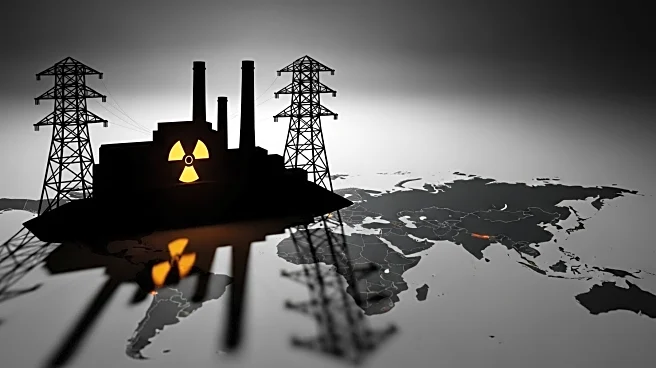What's Happening?
Ukrainian President Volodymyr Zelenskyy has accused Russia of posing a global security threat following a Russian shelling attack that cut power to the defunct Chornobyl nuclear plant. The attack on a nearby substation led to a blackout at the site, which houses the damaged reactor core from the 1986 meltdown. Emergency diesel generators are currently supplying electricity to the confinement structure. This incident follows a similar power loss at the Russian-occupied Zaporizhzhia nuclear plant, where backup generators are being used to prevent a meltdown. The United States is reportedly providing Ukraine with intelligence for long-range missile strikes on Russian energy infrastructure, aiming to deprive the Kremlin of revenue and oil.
Why It's Important?
The power cut at Chornobyl highlights the ongoing risks associated with the conflict in Ukraine, particularly concerning nuclear safety. The reliance on backup generators at both Chornobyl and Zaporizhzhia underscores the precarious situation and potential for nuclear disaster. The U.S. support in targeting Russian energy infrastructure could escalate tensions further, impacting global energy markets and geopolitical stability. European countries are also feeling the effects of what Denmark's prime minister described as a 'Russian hybrid war,' involving drone incursions and sabotage. The situation is considered the most dangerous since World War II, with implications for international security and economic stability.
What's Next?
The European Union is considering urgent measures to counteract Russian threats, including a 'drone wall' and enhanced defense systems for its eastern borders. The G7 finance ministers have pledged to increase pressure on Russia's oil exports and are considering trade measures against entities financing Russia's war efforts. These developments indicate a potential increase in international sanctions and military support for Ukraine, which could further strain relations between Russia and Western countries.
Beyond the Headlines
The ongoing conflict and associated threats to nuclear facilities raise ethical and legal questions about the conduct of war and the protection of civilian infrastructure. The potential for nuclear incidents poses long-term environmental and health risks, while the geopolitical tensions could lead to shifts in international alliances and economic policies. The situation also highlights the vulnerability of energy infrastructure in conflict zones and the need for robust international frameworks to address such challenges.











